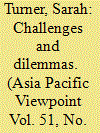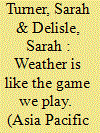|
|
|
Sort Order |
|
|
|
Items / Page
|
|
|
|
|
|
|
| Srl | Item |
| 1 |
ID:
097886


|
|
|
|
|
| Publication |
2010.
|
| Summary/Abstract |
The Chinese, Vietnamese and Lao spaces within the upland Southeast Asian massif, sheltering over 80 million people belonging to geographically dispersed and politically fragmented minority populations, have only recently reopened to overseas academic endeavours. Undertaking social sciences research there among ethnic minority groups is underscored by a specific set of challenges, dilemmas, and negotiations. This special issue brings together Western academics and post-fieldwork doctoral students from the realms of social anthropology and human geography, who have conducted in-depth fieldwork among ethnic minorities in upland southwest China, northern Vietnam, and southern Laos. The articles provide insights into the struggles and constraints they faced in the field, set against an understanding of the historical context of field research in these locales. In this unique context that nowadays interweaves economic liberalisation with centralised and authoritarian political structures, the authors explore how they have negotiated and manoeuvred access to ethnic minority voices in complex cultural configurations. The ethical challenges raised and methodological reflections offered will be insightful for others conducting fieldwork in the socialist margins of the Southeast Asian massif and beyond. This specific context is introduced here, followed by a critique of the literature on the core themes that contributors raise.
|
|
|
|
|
|
|
|
|
|
|
|
|
|
|
|
| 2 |
ID:
076400


|
|
|
|
|
| Publication |
2007.
|
| Summary/Abstract |
Throughout periods of political instability and economic adversity - from Dutch colonial rule, through President Suharto's period in office, to more recent times - ethnic Chinese in Indonesia have been recurrent scapegoats for violence. Suharto, especially, manipulated local perceptions of the Chinese in the economic and political arenas, to suit the needs of his government. Yet, circumstances have changed since the 1998 riots in Indonesia and Suharto's departure. Subsequent presidents have introduced legislation aimed at reducing legal restrictions on Chinese Indonesians and they, in turn, are beginning to have greater public voice through a diversity of outlets. These include the growth of numerous new print and television media; a flourishing literature sphere; the rise of a variety of political parties, both ethnicity-based and more wide-ranging; and the development of non-political organisations, some tackling discrimination and others focusing upon Chinese sociocultural needs. These channels are facilitating the appearance of new and re-emerging ethnic Chinese identities, some surfacing from over 30 years of imposed dormancy. This paper is a preliminary investigation of manifestations of these identities among ethnic Chinese in Indonesia's contemporary public realm.
|
|
|
|
|
|
|
|
|
|
|
|
|
|
|
|
| 3 |
ID:
097892


|
|
|
|
|
| Publication |
2010.
|
| Summary/Abstract |
Given the increased attention in anthropology and human geography to the positionality and reflexivity of researchers completing fieldwork in foreign countries, it is surprising that we still know relatively little about how research assistants and interpreters are positioned in the field and their own concerns, constraints and coping mechanisms. This article, based on in-depth interviews with local interpreters/research assistants in Vietnam and China, working alongside Western doctoral students researching upland ethnic minority populations, provides space for the assistants' voices. While reflecting upon their own time in the field, we see how the positionalities of these individuals can have rather unexpected consequences. Furthermore, the assistants' analyses of particular events, as well as their take on the best way to proceed in specific circumstances can be at odds with that of their employers, and negotiated coping strategies have to be found. The article concludes with advice from these assistants regarding how future assistants can make the best of their position, and what foreign researchers need to consider in fostering constructive working relationships.
|
|
|
|
|
|
|
|
|
|
|
|
|
|
|
|
| 4 |
ID:
147455


|
|
|
|
|
| Summary/Abstract |
In colonial Southeast Asia, the process of enclosure aimed to integrate communities living in the borderlands, along with their lands and resources, into the state project. In 1891, the newly established French colonial administration in Tonkin (northern Vietnam) decided the upland region bordering China should be physically and administratively enclosed to achieve these aims. The governor general ordered the French military to administer these borderlands and to complete two surveys of local ‘tribes’ in 1897–1898 and 1903–1904 to make upland populations and their livelihoods more legible and, the administration hoped, more controllable. By examining details of these surveys, we not only obtain proof of this enclosure project but we also gain rare insight into and a snapshot of upland border livelihoods at the turn of the 20th century. The surveys reveal details regarding local cross-border trade strategies, marketplace manoeuvres, the means by which the colonial government enforced a common currency and, despite such attempts, the enduring nature of barter. We probe how local populations reacted to the state's processes of legibility, and in particular, how upland residents adapted their trade livelihoods to the new realities of being included within the colonial state and, progressively, within the national economy.
|
|
|
|
|
|
|
|
|
|
|
|
|
|
|
|
| 5 |
ID:
192942


|
|
|
|
|
| Summary/Abstract |
In Vietnam's capital city Hanoi, the growing popularity of application based (app-based) motorbike taxis has offered many inhabitants new opportunities to pursue a mobile livelihood with ride-hailing platforms. Nonetheless, as this influx of app-based drivers has hit the city's streets, specific livelihood and mobility frictions have emerged, notably with informal, ‘traditional’ motorbike taxi drivers, or xe ôm. In this paper we analyse these evolving sites and moments of friction and their impacts on driver livelihoods and mobilities for both driver groups. We draw conceptually on debates regarding mobility, platform economies, and urban livelihoods, while specifically interrogating the concept of friction to highlight three possible analytical applications. Methodologically, we interpret static and ride-along interviews completed with over 130 drivers. We highlight a range of tactics ‘traditional’ and app-based motorbike taxi drivers have employed to respond to rising frictions, defend their ‘turf’, and maintain their street-based livelihoods. Driver responses reveal differing access to distinctive forms of social capital and social networks, and contrasting levels of agency regarding their mobilities. By conceptually teasing apart the notion of friction, we wish to expand and deepen understandings of the experiences of vulnerability, precarity, and other impacts of platformisation for different motorbike taxi driver cohorts.
|
|
|
|
|
|
|
|
|
|
|
|
|
|
|
|
| 6 |
ID:
149598


|
|
|
|
|
| Summary/Abstract |
The Vietnamese government, along with country-based non-government organisations, are well aware of the vulnerability of Vietnam's coastal and low-lying areas to extreme weather events. Yet scant attention has been paid to extreme weather hazards affecting Vietnam's northern mountainous regions and the livelihoods of ethnic minority farmers residing there. Building on conceptual tools from vulnerability, food security and sustainable livelihoods literatures, we examine the impacts of extreme weather, namely drought and severe cold spells, in Vietnam's northern uplands. We explore the degree to which these events impact the livelihood portfolios and food security of ethnic minority farmers, and examine the coping strategies households initiate, based on their ecological knowledge as well as recent market integration initiatives. Drawing on ethnographic fieldwork with ethnic minority Hmong and Yao semi-subsistence households undertaken yearly from 2012 to 2014, we demonstrate that financial capital – now more central to households' livelihoods than ever before due to state-sponsored agricultural intensification – is an important means for farmers to cope with extreme weather events. Yet concurrently, longstanding culturally rooted social capital, networks and ties remain critical. Nonetheless, short- and long-term adaptation is not widespread, leading us to investigate possible explanations.
|
|
|
|
|
|
|
|
|
|
|
|
|
|
|
|
|
|
|
|
|